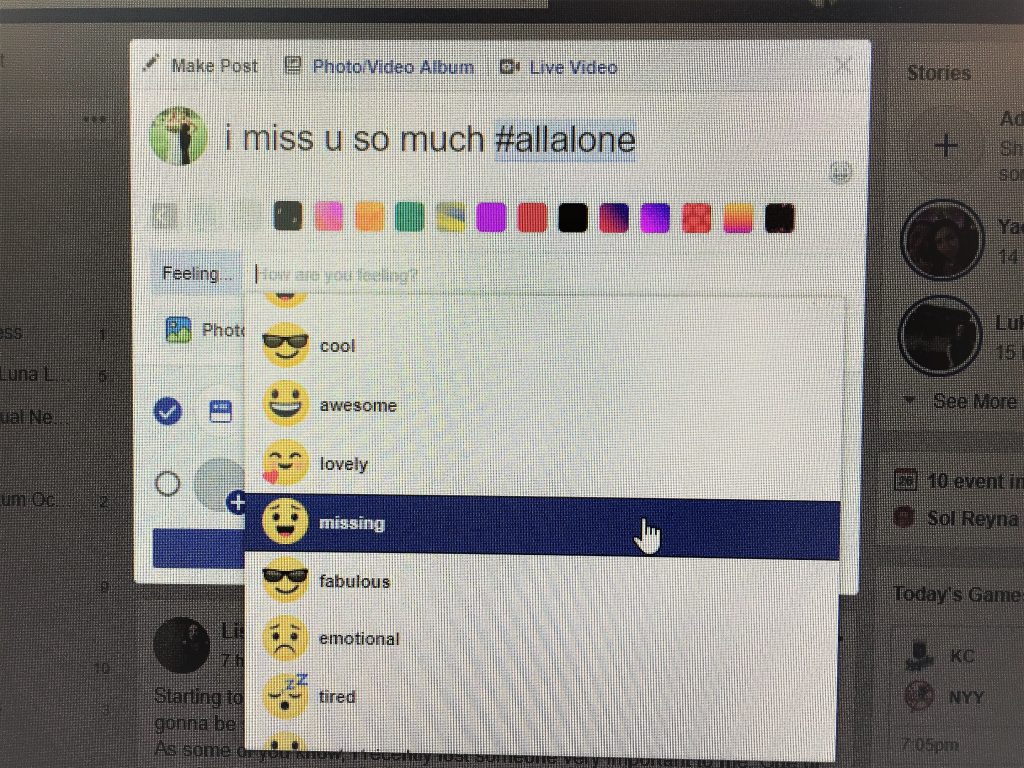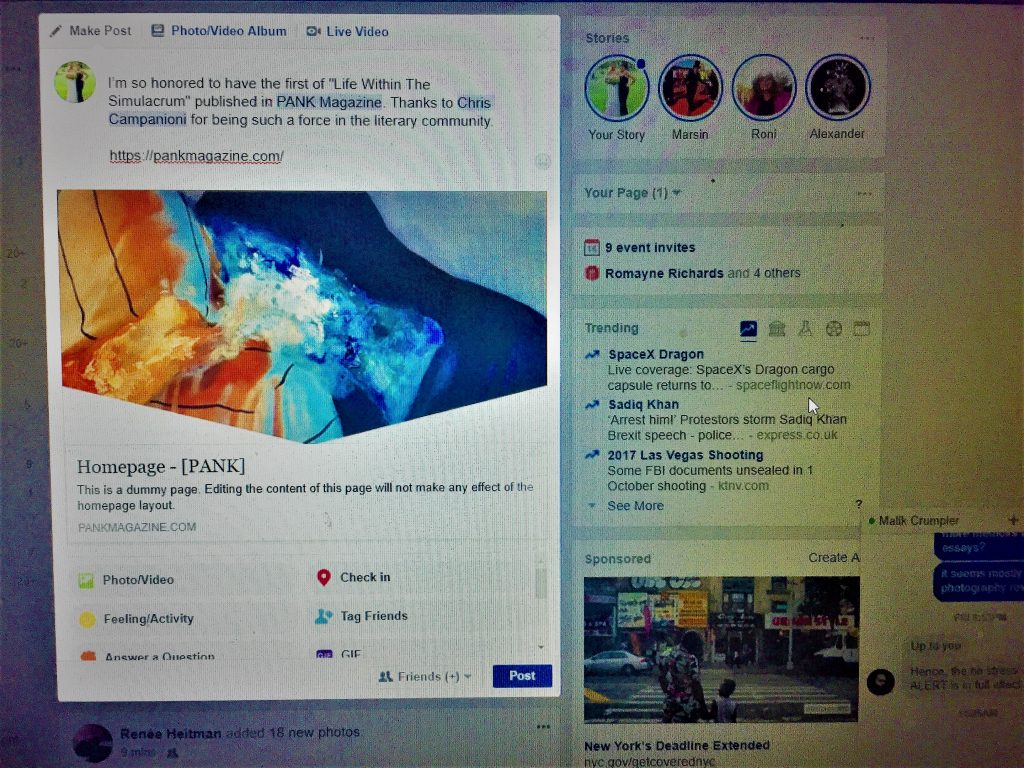Life Within the Simulacrum is a featured column focusing on technology & social media, travel & literature.
BY DALLAS ATHENT
–
It was 2:43 which meant in 17 minutes I’d have to call my Uber to get out of Paris and to the airport. The light poured in through the balcony, causing our sausage sandwiches and olives to glow. We had just picked them up from the local market full of people screaming at us in French about sausage links and cutting cheese by the kilo. Reminiscing, my friend Malik reminded me of a Four Loko party we went to long ago on a rooftop in Bushwick.
“Yo that shit was lit.”
“Kids don’t party like that nowadays,” I said.
“Ha! Kids!” he remarked, as if we were so old.
I reluctantly look at my watch again and said abruptly and with purpose, “I have to call my Uber.” He said he’d accompany me downstairs. “Ugghh,” I began, “I don’t want to say goodbye.”
“C’mon Dallas. Don’t get nostalgic, get your stuff and go.”
He was right. Malik is wise and knows how to deal with things like sentiments. I, on the other hand, do not.
In the past two years I’ve been to Switzerland, England, France, Scotland, Iceland, Italy, Canada, The Caribbean and more, often multiple times and various cities. Within the U.S. I’ve visited Santa Barbara, Palm Springs, San Diego, New Orleans, Santa Fe, D.C., Boston and Ft. Lauderdale. I have two jobs. I work onboarding project teams into construction software, so I get to visit the construction companies and their projects wherever they happen to be building them. I’m also a writer, which means I’ve made friends with other writers who then work in a community around the world. I’m on a plane every other week visiting clients for work, and often, people in publishing and my colleagues in literature.
Of course, it’s hard to see so many places and not document it. I take a photo each day I’m traveling and usually share it with those in my network. It’s a way for me to communicate my experiences. Most people see someone who is having the time of their life trying new foods (sheep’s brain) and meeting new people (like the owners of a small Chateau in Thiers).

The truth is, each time I leave a place I have to fight off an existential crisis. I can see myself living just about anywhere. I connect with landscapes, be they be the vast abyss of the sea or laced with mountains. I look at the art, like the impressionist paintings with their shapes and pastels in Paris or the totem poles in Vancouver.
But something even stranger happens when you get to know people. You get attached. On a trip I took to Europe this year I started my stay in Edinburgh on the floor of my best friend’s dorm room. Edinburgh is a stunning city, full of crooked alleys and looming stone buildings you can get lost in. You see ghosts and drink in pubs with plaid walls, which provides a certain comfort, but doesn’t necessarily inspire most people who visit to go back for a second week in a year. For me it did, because my best friend Daniel was there, and I missed him.
Our moments together were wonderful and fleeting. We discussed poetry and literature, but every night I laid my head down I knew it was temporary, as this friend of mine was someone I once met with every weekend in New York coffee shops to write and on rooftops to party. Someone, who, in my 20s would bike past me each morning on his way to work as I stood at a bus stop for my commute, and would wave. In those days I thought we’d be best friends forever and we still are, but our relationship is based on sparse visits where we get together and reminisce, and know that time will ultimately bring us apart again. In our new relationship, we’re aware that time is something intangible and mortality will eventually put a halt on the amount of times we see each other.
While in Edinburgh we hung out with his roommates from Romania who were getting their Bachelor’s. They were maybe twenty. As we went out for drinks one of them told me about how he wanted to work in HR on progressive subjects. He was also highly interested in the #metoo movement. He seemed wise beyond his years. As we spoke over pints together in a pub that had live banjos playing and velvet walls, I wondered if the conversation mattered, because I would likely never see him again.
I have so many interactions like this. I make the most of my time in a place, doing my best to be fully invested and not take my luxury of travel for granted. I ask people about their lives, their days. I ask not what the most recommended restaurant is, but which one gives the best feeling. I always offer people to stay at mine if they ever come to New York since so many people do come to visit my city. It feels like a good way to keep the door open. So far, nobody other than those I’ve known for over seven years has taken me up on it.
When I got to Luzern after Edinburgh I met up with my friend Boni Joi, a poet I admire and someone I became friends with a few years ago while she was living in New York. She moved there with her husband, who’s Swiss. Her neighbor, who Boni’s very close with, offered up her apartment since she was away the week I was staying. I had a penthouse all to myself, overlooking the mountains and a small church, but most importantly, the woman left notes for me, saying she was happy I could stay there and to help myself to coffee and beer. The woman had her drawings and fashion designs up on the wall. She had little trinkets from her travels, and stunning kimonos hung in the bathroom. I knew so much about her but she knew nothing about me. I wondered if I’d ever even meet her.
The next day, Boni brought me up the mountains in a gondola, the fog allowing us no vision, which we passed through with time only to arrive on top of the clouds with a spanning view of the alps. The experienced was a reminder of separation, and how many microcosms exist within this one world.
At the top of the mountain we got some drinks in the one building that exists there — a little hotel with a restaurant attached. As we laughed, the sun began to set and we knew it was time – one hour closer to the handful of nights we may have together again.
The more and more I get on a plane, the more and more I fall in love. With cities, but mostly with people. There’s nothing like travel to remind you that you can never be everywhere in this life, but especially that we’re all essentially alone. The existential dread can sometimes be turned into a positive, (like not taking anything for granted, and learning to really listen to people), but it can also become overbearing. I go from airport to airport all by myself. I’ve been dealing with the fact that no matter how close I feel to people, I’ll always have to say goodbye.
When I got to Paris, my friend Daniel flew in from Edinburgh to meet me. We walked around the museums of Impressionists and I saw how they all loved. Many of them had short lives. I wondered if they counted their moments with a lover. If they put a clock against their experiences the way we do today.
My last day in Paris I went the a local market with Daniel and Malik. I was grabbing sausages while my two old friends were across two rolls of stalls, picking out gratin. Malik, now a local, was pointing at what Daniel should pick out. I saw Daniel laugh. I was an outsider, looking in, and yet I was there. I wondered what Malik’s arm pointing looked like from Daniel’s perspective, and if what Malik said that made Daniel laugh was something that would stick with him forever, or was just a moment we were once again sharing. It was a simulacrum I created in my mind–but it was also a real thing happening to two people. I was there, and yet not there. Time pressed down to us having to get back to the apartment so I could call my Uber. A melancholy washed over me once more, and I learned to swallow it, because if I didn’t, I could miss the moment.
–
Dallas Athent is a writer and artist. She is the author of THEIA MANIA, a book of poems with art by Maria Pavlovska. Her work, both literary and artistic has been published or profiled in BUST Magazine, Buzzfeed Community, VIDA Reports From The Field, At Large Magazine, PACKET Bi-Weekly, YES Poetry!, Luna Luna Magazine, Bedford + Bowery, Gothamist, Brooklyn Based, and more. She’s a board member of Nomadic Press. She lives in The Bronx with her adopted pets.
![[PANK]](https://pankmagazine.com/wp-content/themes/pank/assets/images/pank-logo-large.png)

